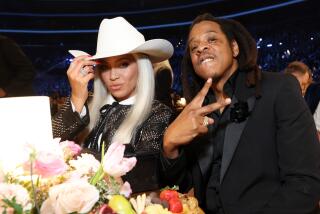A David Takes On Goliath Named KIIS
- Share via
Here’s a first: Ever heard of a record company that demanded that a radio station stop playing its record?
It happened earlier this month when Sutra Records, a small, New York-based independent label, fired off an angry telegram to KIIS-FM insisting that the highly rated Top 40 station stop playing the label’s Cover Girls hit, “Because of You.”
Why? Because KIIS played the song consistently for eight weeks, Sutra president Art Kass charged, but never reported it to key industry trade publications as being a part of the station’s playlist.
As Billboard magazine noted recently, since radio playlists are used to compile the magazine’s Hot 100 singles chart, records which are played, but not added, rarely chart as highly as they deserve. The Cover Girls single cracked the Billboard Top 30--a milestone for a little-known group on a small label--but it’s possible that it could’ve performed better with more official radio support.
“It’s wrong and it’s been very frustrating for us,” Kass complained. “They’re using our record to help get ratings. But they’re hurting our chances of having a bigger hit.”
As other execs have pointed out, making KIIS’s playlist has a trickle-down influence on many smaller stations around the country. “KIIS is one of the top three stations in the country,” Kass said. “So a lot of stations take their cues from them. If KIIS adds a record, they’re going to follow suit because KIIS is a real opinion-maker in national radio.”
Kass and other indie label chiefs claim stations like KIIS treat smaller record companies as second-class citizens, giving preferential treatment to bigger, more powerful labels. “There’s definitely a double standard at work,” Kass said. “If this record had been on a major label, there’d be no doubt at all that KIIS would’ve added it.”
Most major record company execs are equally peeved by what they call a “widespread” radio practice of playing songs, but not adding them, though many say big labels are victimized just as often as small ones.
“I can see why the small labels are so incensed, but radio does it to us too,” said PolyGram promotion vice president John Brodey. “It’s a way of radio dealing with a record without making a commitment. Just recently we’ve had bands like the Rainmakers who were played on stations, but never reported.
“I’m sure smaller labels don’t always have the same kind of leverage as a major company, who has a big artist coming down the road. But we all have showdowns--and the showdowns usually work out in radio’s favor.”
Geffen Records promotion exec Marko Babineau said his label’s Guns ‘N Roses album has been out for six months--with 25 stations adding the heavy-metal band’s record to their playlists, but at least 25 more airing it at night without reporting it.
“They were afraid to report it because they thought the band’s image was too dangerous or disturbing,” he said. “But we just took out some major advertising and the group has a strong video out there--and suddenly we got 40 adds, more than we’ve had in the whole life of the album.”
However, Babineau acknowledged that major labels do have better odds of getting added to radio playlists. “Let’s put it this way: When you’re spending a large amount of advertising money on a consistent basis with radio, it’s going to have a cause and effect. So small labels will sometimes have problems. That’s reality--this is a business of relationships.”
As for the Cover Girls, Kass said his telegram got results--KIIS stopped playing the record. “The reason I got so upset was that no one at KIIS would return my calls. I tried calling (program director) Steve Rivers several times each week, but could never reach him. After I sent the telegram, I got their attention. We’re really not enemies. Since then we’ve had several nice talks--and I think we’ll have better communication in the future.”
Pop Eye couldn’t reach Rivers either--he did not return numerous phone calls. (Maybe we’ll send a telegram.)
More to Read
The biggest entertainment stories
Get our big stories about Hollywood, film, television, music, arts, culture and more right in your inbox as soon as they publish.
You may occasionally receive promotional content from the Los Angeles Times.







